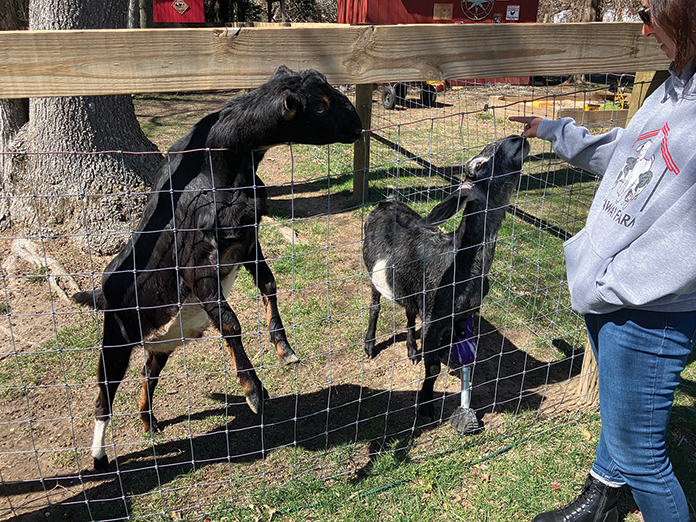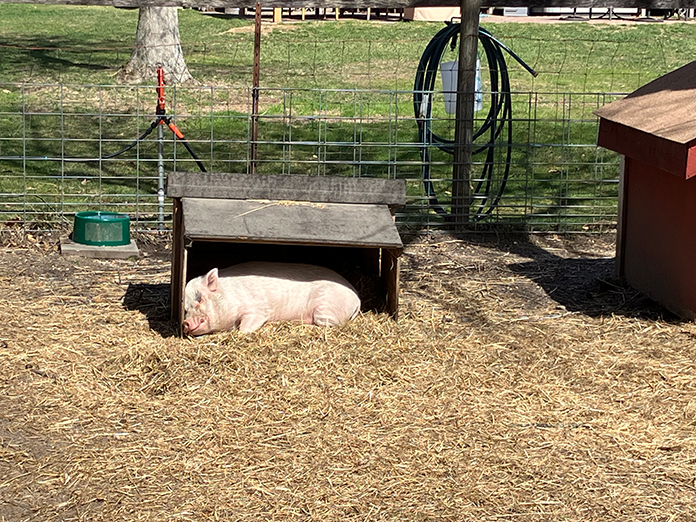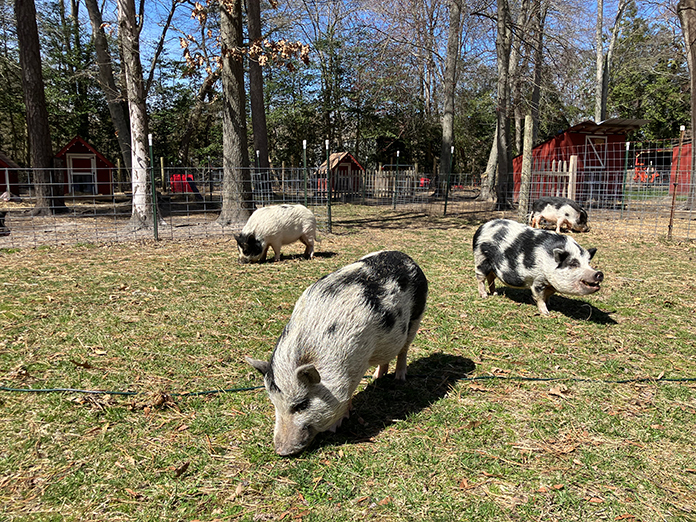
BERKELEY – Runaway Farm grew out of a family’s love for animals and it all started quite organically.
For years, the Leighton family – Jen, Chris and their daughter Keira – have cared for farm animals in need, starting up a nonprofit to further those goals.
Currently, the Hickory Lane property is home to eight pigs, seven goats, two horses and a miniature cow. Where did they come from? A surprising number of them were strays. You wouldn’t think that there could be a stray cow, but that’s how they got Luna.
A miniature cow had been rescued by a local resident from a situation in Pennsylvania. But Luna spooks easily and bolted. She wound up wandering around the woods until she was corralled here. She’s more trusting of her adoptive family than strangers, but the Leightons still give her space. Her barn has drawings made by a visiting class from Ocean Gate Elementary.
Luna does get to socialize with the two horses on the farm. Even though Luna’s pen is in the back and the horses have the front yard, there’s a gated path that links them. During the day, they are allowed to intermingle, but at night they go back to their usual spots.
While The Berkeley Times was visiting, the door separating the two spots was opened. Duke, a former race horse, trotted back to Luna’s enclosure with the perfect gait he had been trained with. His racing name was “Point of Attack.” They found videos of him racing but it’s hard to watch him getting whipped. He retired at 12 years of age.

A little while later, Tally made her way there slowly. She has arthritis and some scars. They don’t know what her story is.
That’s the difficulty with learning about rescue animals’ medical history and temperaments. The humans telling the story might not be so forthcoming with the details – especially if those details might incriminate them.
For example, they recently picked up a goat that was supposedly a friendly female. It turned out to be the largest male goat they’d ever seen who was scared of them.
“We can’t touch him,” she said. “We don’t know what was done to him,” she said.
Tommy and Jelly were two goats that have some issues. Tommy is missing his ears. They were told that Tommy’s mother chewed them off, which is something that apparently happens. However, they have a small suspicion that abuse was the cause. Jelly was born with problems with two of her legs. One of them can’t extend all the way so she wears a prosthetic during the day (she can’t sleep with it).
The Leightons were happy to tell the stories they do know. Their goat, Delta, was owned by someone. The goat got spooked and was running around Route 9. They opened their front gate and the goat found her way in. As it turns out, she was pregnant. So that’s how two of the goats found homes here.
Two pigs had a completely different story. A couple of teenagers bought them at Harker’s auction in Tabernacle. They took them home as pets without their parents’ consent. Pigs are smart, and they eventually figured out a way to escape. So, they were wandering around Bayville.

“I spent the night of my 21st birthday running around Bayville chasing pigs,” Keira said.
Killian and her sister were the first goats they adopted, although only Killian remains.
Casey is a deaf, white pig that had to be surrendered. She has her own enclosure. She gets scared when the other pigs are near her because she can’t hear them coming. It’s not that she’s aggressive, but she doesn’t realize what is happening around her so she lashes out.
One pig actually came from Popcorn Park Zoo. He is so friendly and loves people so much that the zookeeper brought him over because he could get more attention living with a family than he could at a zoo.
Two pigs came from a hoarding situation in New Egypt where someone had 50 pigs.

The farm isn’t open to the public, but they do have visitors from time to time, such as the ARC and some local schools.
“We had no intention of starting a sanctuary,” Jen said. “There are just animals in our community that needed help.”
When a new animal comes in, it goes through a quarantine period until it has a full bill of health and then it’s introduced to the herd. They watch as the animals’ personalities mingle and see where they will be a good fit.
The family has 4.5 acres on Hickory Lane. Jen’s husband, Chris, is extremely handy and has built all the enclosures and shelters. Jen always wanted a horse, and the family has always fostered puppies.
They are at their limit for large animals, Chris said. The suggested rule is one acre per large, hoofed animal, so they don’t want to crowd them in.
A lot of these farm animals wind up in sanctuaries because people don’t realize how much work they are to keep.
“Animals deserve to live like this,” Jen said.

How To Help
Runaway Farm has merchandise for sale through Facebook and Instagram, and people can sponsor an animal.
They are also holding their third anniversary on May 18 from 11 a.m. until 3 p.m. at 39 Hickory Lane. There will be vendors, live music, food, a bake sale and giveaways.
The Wranglebrook Community Garden, a nonprofit group of volunteers that runs a stretch of land between Lakehurst Road in Toms River and Silver Ridge, donates food.
Costco provides a palette of food per week. It’s all produce that they can’t sell. For example, the bag might be ripped or the skin is bruised. It keeps the food out of the dumpster and saves the farm a ton of money.
“We wouldn’t feed the animals anything we wouldn’t eat,” Chris said.
They’ve joined the loose network of other sanctuaries that help each other out, Jen said. They also will reach out to other sanctuaries if someone asks for help that they can’t provide.
The support from the residents has been wonderful, they said.
“The community has just been so supportive of this,” she said.







